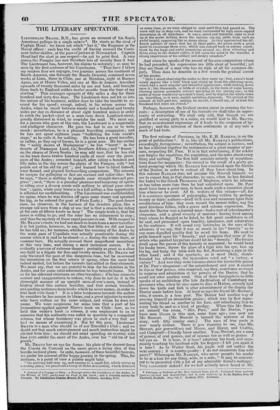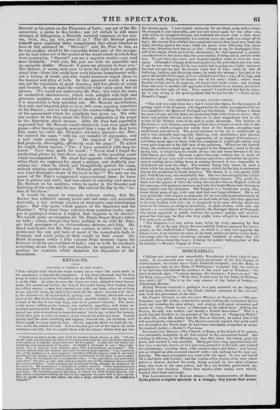The first volume of Parriana, by Mr. E. H. BARKER,
is on the point of publication *. It is, like all Mr. BARKER'S publications, exceedingly farraginous ; nevertheless, the subject is curious, and he has collected together the testimonies of a great number of per- sons, respecting Dr. Parr. It is in fact entertaining, if the reader can forgive the repetition, the reprinting, and the notes about every thing and nothing. The first half consists entirely of republica- tions from the magazines : the second is the result of a pretty ge- neral pumping which Mr. BARKER has exercised upon the friends of the Doctor, in order to extract all they knew about him. In this volume BARKER does not assume the Boswell himself: we are to expect him in that character, he says, when lie has finished the Index to the Greek Thesaurus of Stephens, which he informs us has taken more time than he had calculated upon. Dr. Parr must have been a great man, to have made such a sensation about him wherever he went. All th., writers of this volume—all, for it is a curious specimen of polygraphy, being written by perhaps twenty or thirty authors—dwell with awe and reverence upon their recollections of him : they even record the merest trifles, nay the most frivolous follies, with a grave and solemn expression. No doubt the Doctor was a_learned man—had a sort of schoolmaster's eloquence, and a great vivacity of manner: having lived among boys whom he flogged as lie listed, he felt great confidence in all he said, and presumed upon timidity, ignorance, and admiration in his audience. It will sound very heterodox in the ears of his admirers if we say, that it was as much to his " ferocity " as to any more dienified quality that he owed his fame. He used to pride himself upon his " ferocity," and complain that none of the artists who painted his picture could hit his " ferocity:' His friends dwell upon the power of this ferocity in argument : he would bend his bushy brow, throw the glare of a tiger into his eye, toss up his leg, and bang the table with his fist, flourishing a pipe in the other hand ; and if the spectacle, as is most likely, dumb- founded his adversary, the bystanders cried out " a victory, a victory ! " And now they write volumes about the irresistible power of Dr. Parr's eloquence—of the astonishment and awe it excited in this or that person, who remained, say they, sometimes so wrapt in surprise and admiration at the powers of the Doctor, that he could not utter another word. One of these biographers-in-little speaks of an archbishop (the late Archbishop of Canterbury we presume) who, when he once came to dine at Hatton, actually laid down his knife and fork in utter astonishment at the display the Doctor made before him. At least so says his friend Mr. Stewart ; who, it seems, is a true poet. The Doctor had another way of proving himself an irresistible genius ; which was by first repre- senting his friend as another to his face, and introducing him to every body he met as a kind of prodigy. When this Mr. Stew- art entered the room, " Mrs. Parr, " said the Doctor, " you have seen Moore in this spot, some time ago ; you now see
Mr. Stewart. [Mr. Stewart is himself the narrator of this story, with fifty similar ones.] The race of true poets is
now nearly extinct. There is you (turning to me, says Mr. Stewart, par parentage) and Moore, and Byron, and Crabbe, and Campbell—I hardly know another. You, Stewart, are a man of genius, of real genius, and of science too as well as genius. I tell you so. It is here, it is here ! (shaking his head, and saga-
•
ciously touching his forehead with his finger)—I tell you again it is here ! As to Walter Scott, his jingle will not outlive the next century ; it is namby-pamby : I do not enumerate him with poets !" Whereupon Mr. BARKER, who never permits his reader to be at a loss for any thing, adds, in a note, " It may be conveni- ent to be presented with a list of my admirable friend's writings." Very convenient indeed ! for we had actually never heard of Mr.
* Parriana, or Notices of the Rev. Samuel Parr, LL.D. Collected from various sources, printed and manuscript, and in part written, by E. H. Barker, Bsg. of Thetford, Norfolk. Svc). vol. 1. London, 1828. Colburn. Stewart or his poem on the Pleasures of Love ; nor yet of the Re- surrection, a poem in five books ' • nor yet (which is still more strange) of Alhagranza, a Moorish metrical romance, in ten can- tos, 1816, 4to., pp. 446, price 21. 2s. ! This Mr. Stewart prides himself upon repeating those compliments that others blushed to hear or felt ashamed of. " Stewart 1" said Dr. Parr to him, as he was reading aloud to his venerable friend part of the newspa- per he had taken out of the pocket of the stage-coach in which they were journeying, " Stewart ! you are a superior reader—you read most distinctly. /tell you, Sir, you are both an agreeable and an energetic reader. Proceed : it gives me pleasure to hear you." The Doctor, it seems, took care to have the right kind of people about him—those that could hear such fulsome compliments with- out a feeling of insult, and who would moreover repeat them to the honour and glory of both. In this ignorant world, if a man can get the reputation of great learning, and has plenty of vanity and vivacity, he may make the world put what value upon him he pleases. We would not undervalue Dr. Parr ; but when the traits of undoubted charlutanerie, which were mingled with high and generous qualities, are recorded as marks of stupendous genius, it is impossible to help speaking out. Mr. Stewart nevertheless, first-rate and forgotten poet as lie is, tells some amusing anecdotes of the Doctor ; and we will forgive his solemn trifling for the sake of the amusement which his simplicity has given us. We refer our readers to the story about Dr. Parr's admiration of the paper in the Spectator about dreams. After Dr. Parr had repeatedly requested that Mr. Stewart would attentively read over again this paper—after having eagerly procured him a copy at the first town they came to—after Mr. Stewart's attentive perusal—the Doc- tor entered the room " with his eve brimful of expression, and a half smile curling his lip." He inquired if Mr. Stewart had properly, thoroughly, electively read the paper? To which his simple friend replies, " Yes : I have perused it with deep in- terest." Now then, mark the result : " Never shall I forget the intellectual glance he then threw upon me, or the speaking smile which accompanied it. He stood full opposite without changing either (foot, we suppose) for about a minute, and stedfastly exa- mining me ; when he slowly and thoughtfully quitted the room, without uttering another word." Without uttering a word f—what was Lord Burleigh's shake of the head to this ?* We here see the secret of Dr. Parr's exaggerated conversational fame : he knew how to glance and smile, and was adroit in selecting such men as Mr. Stewart as his auditors, when he spoke in the thunder and lightning of the voice and the eye. He carried the day by the " ter- rors of his brow."
It would be unjust to conclude without stating, that Mr. Barker has collected, among much odd and some very accessible materials, a fair average portion of instructive and entertaining pages. But why quote whole papers of the Spectator and the Rambler ? Why insert huge extracts from common books, apro- pos to perhaps a worclor a subject that happens to be started ? We would make an exception for Mr. Hugh Stuart Boyd's letters on bells ; which, though they have nothing to do with Dr. Parr, are droll specimens of an extraordinary memory and folly. Mr. Boyd had heard that Dr. Parr was curious in bells—that he re- membered the size and tone of most of the remarkable bells in England, and could judge of their weight by their sound. Mr.
Boyd hereupon writes a little volume from memory (upon his honour) of all he can recollect of bells ; and in truth he recollects
everything about both bells and steeples : he appears to have a memory for numbers which demands the inquisition of Dr. Spurzheim.



















 Previous page
Previous page